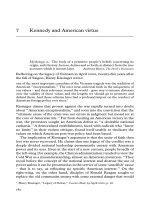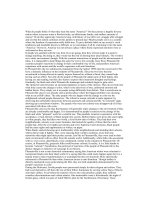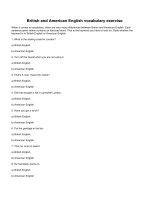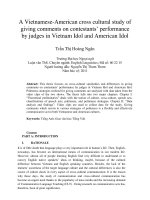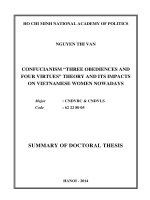Kennedy and American virtue
Bạn đang xem bản rút gọn của tài liệu. Xem và tải ngay bản đầy đủ của tài liệu tại đây (112.75 KB, 20 trang )
7 Kennedy and American virtue
Mythology, n.: The body of a primitive people’s beliefs concerning its
origin, early history, heroes, deities and so forth, as distinct from the true
accounts which it invents later.
Ambrose Bierce, The Devil’s Dictionary
ReXecting on the legacy of Vietnam in April 2000, twenty-Wve years after
the fall of Saigon, Henry Kissinger wrote:
one of the most important casualties of the Vietnam tragedy was the tradition of
American ‘‘exceptionalism.’’ The once near-universal faith in the uniqueness of
our values – and their relevance round the world – gave way to intense divisions
over the validity of those values and the lengths we should go to promote and
defend them. And those schisms have had a profound impact on the conduct of
American foreign policy ever since.
1
Kissinger claims that protest against the war rapidly turned into doubt
about ‘‘American exceptionalism,’’ and soon into the conviction that the
‘‘ultimate cause of the crisis was not errors in judgment but moral rot at
the core of American life.’’ Far from desiring an American victory in the
war, the protesters sought an American defeat as ‘‘a desirable national
catharsis.’’ A demoralized establishment, faced with radicals who ‘‘knew
no limits’’ in their violent critique, found itself unable to vindicate the
values on which American post-war policy had been based.
The implication of Kissinger’s argument is that the unity of faith then
lost was never recovered. He claims that one legacy of the conXict was a
deeply divided national leadership permanently uneasy with American
power and its uses. Even at the start of a new century, people broadly of
the left-wing (for example, the Clinton administration) tended to view the
Cold War as a misunderstanding, almost an American invention. ‘‘They
recoil before the concept of the national interest and distrust the use of
power unless it can be presented as in the service of some ‘unselWsh’ cause
– that is to say, as reXecting no speciWc American interest.’’ On the
right-wing, on the other hand, disciples of Ronald Reagan sought to
replace the old communist enemy with some external danger that would
… Henry Kissinger, ‘‘Legacy of Defeat,’’ Courier-Mail, 29 April 2000,p.26.
180
provide a focus around which foreign policy may be organized. ‘‘Viet-
nam,’’ wrote Kissinger, ‘‘bequeathed a new generation divided into two
camps – one in search of riskless applications of our values, another in an
erratic quest for a focal point for our national strategy.’’ Implied rather
than stated here is the view that a proper understanding of the Viet-
namese conXict would help heal the ‘‘schism’’ in American politics and
permit the emergence of a more realistic outlook that would form the
basis of a new consensus on foreign policy. Kissinger concludes that: ‘‘A
balanced judgment on Vietnam remains our challenge – not as a question
of historical justice towards individual presidents but of historical truth
about a national tragedy.’’
Kissinger gestures in this article toward an important explanation of
what happened to America and American leadership in the latter half of
the twentieth century. His argument is, however, drastically underdevel-
oped. There is a tone of regret, even of lingering resentment, over those
radical protesters who observed no limits in their rejection of establish-
ment values, but no accounting for the virulence of their reaction. Nor is
an explanation oVered as to why the establishment should have been so
demoralized as to fail utterly to defend its own post-war values. Kissinger
rightly asserts the Cold War to be something more than an American
invention but oVers no analysis of the way that the values embodied in
‘‘American exceptionalism’’ were both subsumed in and distorted by the
grim logic generated by Cold War fears. The persistently bifurcated
attitude of national leaders after Vietnam is correctly attributed to con-
fusions over morality and power, but the precise nature of the division
and its fundamental causes are not explored.
What is clear is that Kissinger wants to see Vietnam reinterpreted, not
so much as an American error and far less an American crime, but as a
national ‘‘tragedy.’’ This is a descriptor that carries intimations of an
impersonal fate over which the actors involved have little control and for
which, consequently, they have diminished responsibility. Kissinger, of
course, was a major player in the ‘‘tragedy’’ (he was head of the National
Security Committee and then Secretary of State under Presidents Nixon
and Ford) and may have particular reasons for wishing to see the war thus
depersonalized. Nevertheless, he is right to want an account that does not
simply attribute Vietnam to the actions and misdeeds of particular presi-
dents and their advisers, but examines the wider context of American
values and attitudes in which those actions occurred. In the next four
chapters I want to pursue such an explanation.
Kissinger’s thumbnail version of American exceptionalism speciWes the
‘‘uniqueness’’ of American values and the presumption of their relevance
to the whole world. It is more accurate, however, to speak of the
181Kennedy and American virtue
proclaimed uniqueness of Americans themselves as the exemplary
bearers of universal values. Though United States history has been punc-
tuated by episodes of messianic zeal and imperial domination, the most
fundamental view of the nation’s self-conceived historic ‘‘mission’’ has
been to act as an example to humanity of what ordinary people in
circumstances of freedom and self-government can achieve. America best
served its mission, in other words, not by paternalistically or imperialisti-
cally imposing its values on others but simply by being itself and thus
revealing to the world the true worth of those values. In his recantatory
memoirs, Robert McNamara, defense secretary under both Presidents
Kennedy and Johnson and chief architect of the policy of containment in
Indo-China, claimed that the humbling lesson America had learnt in
Vietnam was that it had no God-given right to shape other nations in its
own image as it might choose.
2
The presumption of this right was, in
American terms, already aberrant. It was an error that the nation had long
been drawn into by consciousness of its own power and belief in its own
virtue, a combination that grew critical in the dangerously competitive
circumstances of the Cold War.
George Herring, one of the earliest historians of the Vietnam war,
wrote (in a manner foreshadowing Kissinger’s analysis) that one of its
chief casualties was that ‘‘pervasive optimism’’ that was part of the
American character.
3
I will argue that the reason American optimism was
such a conspicuous casualty was that it was founded on a conWdence in
American capacity and power that was mythologically linked to a belief in
American innocence and virtue. American power was seen as a felicitous
by-product of the peculiar American virtue, and American virtue was
believed in turn to be a guarantee of the beneWcent use of American
power. This presumptively indissoluble conjunction of virtue and power
– existentially experienced by Americans as a harmonious combination of
innocence and pride – was the core of what I here term the central
American myth. The myth was sundered by events including and follow-
ing the death of John F. Kennedy, and successive presidents struggled to
reassemble it. Vietnam was the great catalyst, but it was not the only
factor involved and itself requires explanation within the general trajec-
tory of post-war American politics.
The most secure single locus of the American myth, the institution
most responsible for tending its sacred Xame, was the oYce of the
Robert S. McNamara, In Retrospect: The Tragedy and Lessons of Vietnam (New York,
Times Books, 1995), p. 13.
À George Herring, ‘‘The Wrong Kind of Loyalty: McNamara’s Apology for Vietnam,’’
Foreign AVairs 74(3)(1995), pp. 154–158. Herring’s history is America’s Longest War: The
United States and Vietnam, 1950–1975 (New York, Wiley, 1979).
182 Moral capital and the American presidency
presidency. Because of this, it was inevitable that the presidency, or rather
presidents, would be key players in the drama that saw the fracturing of
the myth, and indeed would be held by many to be responsible for the
damage caused. Undoubtedly the actions of successive presidents severe-
ly aVected the moral capital of the oYce itself, but understanding both
why these actions were taken and why the damage was so extensive
requires an understanding of the nature and problems of the presidential
oYce in its relation to the whole of government and to the American
people at large. It also requires an appreciation of the American response
to the challenge of the Cold War, and the way in which Cold War
domestic politics trapped successive administrations, both Democratic
and Republican, into accepting a rigidiWed version of the American myth
that would prove destructive of itself, divisive of the nation, and damaging
to the national moral capital.
The presidency and the national moral capital
One of the principal problems consciously addressed by the founders of
the United States of America was that of maintaining a stable balance
between eYciency and accountability in government. They desired an
eVective executive but, having fought a revolutionary war against British
‘‘tyranny,’’ were fearful of creating a home-grown American ‘‘czar.’’
Many of them thought it possible to establish a government of virtuous
and disinterested men but were alive to the corrupting eVects of power
and concerned to design their institutions so that temptation and oppor-
tunity were minimized. They therefore debated the merits of a plural
executive or of an ancillary Council of State that might forestall presiden-
tial tyranny, but were afraid such institutional courses would cause execu-
tive paralysis.
4
In the end, conWdence was placed in George Washington
to put a singular presidency on the right track, his moral reputation being
such that he could be trusted to give the oYce the necessary weight to
found its legitimacy without setting himself up as dictator. Washington
established the essential shape of the presidency and set the moral tone of
the oYce, becoming himself a moral standard for succeeding generations
of Americans, the very embodiment of national republican virtue.
Apart from Washington and his exemplary precedent, it was hoped that
a separation of power between executive, legislature and judiciary, and its
division between federal government and the States, would provide the
necessary checks and balances to prevent the accumulation of tyrannical
power in any branch of government or in any legislative majority. But
à See the discussion in Arthur M. Schlesinger, Jr., The Imperial Presidency (London, Andre
Deutsch, 1974), pp. 382–386.
183Kennedy and American virtue
separation led inevitably to contestation between Congress and the presi-
dency over control of the national agenda (with the Supreme Court –
guardian and interpreter of the Constitution – playing an adjunct and
variable role capable in some circumstances of turning into limited politi-
cal leadership).
5
The advantage between Congress and the presidency
shifted back and forth, with one or other in the ascendancy for often long
periods. The trend for most of the twentieth century, particularly since
the time of Franklin D. Roosevelt, is usually said to have been toward the
presidency and away from Congress, though the reality is much more
complex than a simple pendulum image suggests (especially given the
complexity of Congress and the increasing fragmentation of authority
within it). Though presidents assumed ever greater powers in modern
times, they did so very unevenly. Nevertheless, as the power and visibility
of the presidency grew, its symbolical role as the heart of American
government grew also. The president came to represent in his person the
virtue, power and promise of the whole American democracy.
The nationally representative function of the chief executive seemed a
natural consequence of the fact that, in a federal system, the presidency
was the only location in which national authority could be securely
embodied. It was the only oYce that could consistently defend truly
national interests as well as intervene to protect the rights of citizens
endangered by powerful local interests. With increasing democratization
in the nineteenth century, the presidency also became more strongly
associated with the popular as well as the national interest. The develop-
ment of the convention system of nomination and changes in the Elec-
toral College turned the election of president and vice-president into a
popular poll. Congressmen, elected to look after the concerns and inter-
ests of particular constituencies and States, inevitably spoke (save in
exceptional circumstances) with discordant voices, but the president
could claim a national mandate that allowed him to assert a univocal
national leadership in the interest of all American people. This unique
position made the presidency, as Teddy Roosevelt said, ‘‘a bully pulpit’’ if
the incumbent were inclined to use it – and presidents in the twentieth
century were increasingly so inclined.
According to scholars of the ‘‘rhetorical presidency’’ school, the grow-
ing use of the presidential podium to garner policy support among the
public altered the very nature of the presidency. Its moral tone changed
from one of high republicanism toward a more democratic mode. While
presidents in the nineteenth century were expected (as we saw in the
Õ On the constitutional foundations of the presidential–Congressional relationship and its
evolution, see Robert J. Spitzer, President and Congress: Executive Hegemony at the Cross-
roads of Government (Philadelphia, Temple University Press, 1993).
184 Moral capital and the American presidency
chapter on Lincoln) to adopt an aloof and digniWed style of governing that
avoided any hint of demagoguery, the rhetorical presidents of the twenti-
eth century have, allegedly, ushered in a much more plebiscitary form of
democratic governance.
6
Franklin Roosevelt’s ‘‘Wreside chats,’’ broadcast
on radio, set an important precedent here. By assuming a new intimacy
with the people, by teaching a new public philosophy and persuading
Americans to accept programs like social security, Roosevelt showed that
it was possible to nurture and mold public opinion through intelligent use
of modern media. By the same means he hoped also to strengthen the
hand of the executive against Congress.
7
Subsequent presidents became
ever more reliant on this form of plebiscitary leadership, partly perhaps
because the decline of political parties in post-war America produced a
need for alternative means of political mobilization. One eVect, according
to some scholars, was the increased ‘‘personalization’’ of the presidency,
a process that got a sharp boost from John F. Kennedy’s use of television
as a means of image projection in the 1960s.
8
Arthur Schlesinger has claimed, however, that the presidency was ‘‘a
personalized oYce from the start, both for political reasons – the interests
of the President – and psychological reasons – the emotional needs of the
people.’’
9
But, however one reads the history, the outcome is the same:
national hopes and expectations have tended to become intensely focused
on the presidency which has consequently had to carry a disproportion-
ate part of the moral weight of the entire governmental system. The
necessity for national leadership, the democratically representative nature
of the presidency, the increasingly direct communication between presi-
dent and people accompanied by greater personalization of the oYce – all
these combined to give the presidency a unique and pivotal role. It also
gave it a unique responsibility, not just for the eVective wielding of power
but for the maintenance of public faith in American government. The
president represented the American people at home and he represented
America to the world, and he must of course represent both at their best.
ΠSee JeVrey K. Tulis, The Rhetorical Presidency (Princeton University Press, 1987); Murray
Edelman, Constructing the Political Spectacle (Chicago, Chicago University Press, 1988);
George C. Edwards III, The Public Presidency: The Pursuit of Popular Support (New York,
St. Martin’s Press, 1983); Samuel Kernell, Going Public: New Strategies of Presidential
Leadership (Washington, DC, CQ Press, 1986); Richard J. Ellis (ed.), Speaking to the
People: The Rhetorical Presidency in Historical Perspective (Amherst, University of Mass-
achusetts Press, 1998).
œ And also against the political parties, according to Sidney M. Milkis, ‘‘Franklin D.
Roosevelt, Progressivism, and the Limits of Popular Leadership,’’ in Ellis, Speaking to the
People, pp. 184–209.
– Theodore J. Lowi, The Personal President: Power Invested, Promise UnfulWlled (Ithaca,
Cornell University Press, 1985).
— This is from a revised edition of The Imperial Presidency (Boston, Houghton MiZin, 1989),
p. 428.
185Kennedy and American virtue
He must represent the people in accordance with that virtuous image of
themselves and their nation they had so long and so publicly cherished,
that they had indeed idealized, apotheosized and transmitted to the wider
world in their Wnest works of popular art. The pilgrims’‘‘shining light on
the hill’’; the ‘‘land of the free, sweet home of liberty’’ promised by
revolutionary principles, guaranteed by constitutional laws crafted by the
founding fathers and painfully and resoundingly reconWrmed by Lincoln;
the brave new world of sturdy individual enterprise and self-government
whose economic success and power were not so much selWsh ends as a
manifestation of the fruits of virtuous independence and thus an example
to all humankind; the priority of the popular will in domestic politics and
the projection of disinterested generosity and goodwill toward foreign
nations – all this the presidential incumbent was perforce required to
shoulder and maintain amidst the normal messy, banal, sometimes sordid
realities of daily government and politics.
If the weight of moral capital with which the oYce was thus imbued
constituted something of a burden on the incumbent as he pursued
everyday political ends, it was also often a boon. Any important oYce in a
respectably legitimized governmental system carries, I have argued, a
certain quantum of moral capital that is transmitted to an incumbent
merely by the fact of their incumbency (at least until such time as they
may show themselves deeply unworthy of it). This moral capital is some-
thing over and above the respect and prestige that accompanies the
assumption of power. Where an oYce is presumed to exist for a good
purpose in a good system – and a fortiori where it has become symbolically
representative of that system – its moral capital inevitably cloaks the
oYce-holder in a mantle that signiWes moral standing and commands
(sometimes exaggerated) moral respect. This mantle can aVord the
wearer serious protection even when their actual actions, judged coldly,
invite condemnation or censure (as even Independent Counsel Kenneth
Starr accepted in the midst of his determined pursuit of Bill Clinton).
10
The problem for any oYce, but particularly for exalted ones like that of
the presidency, is how to guarantee a match between the moral capital of
the oYce and the moral worthiness of the oYce-holder. Schlesinger wrote
with respect to this that: ‘‘In giving great power to Presidents, Americans
declared their faith in the winnowing processes of politics.’’
11
Electoral
Colleges and party conventions were presumed to eliminate aspirants
who rejected constitutional restraints and the republican ethos. Presi-
dents might be more or less worthy, more or less competent, occasionally
…» See Bob Woodward, Shadow: Five Presidents and the Legacy of Watergate (New York,
Simon & Schuster, 1999), pp. 286 and 436.
…… Schlesinger, The Imperial Presidency,p.378.
186 Moral capital and the American presidency
even corrupt, but by and large the system produced leaders who were
faithful to their trust. Theodore White went further and argued that the
‘‘crowning myth’’ of the presidency was:
that the people, in their shared wisdom, would be able to choose the best man to
lead them. From this came the derivative myth – that the Presidency, the supreme
oYce, would make noble any man who held its responsibility. The oYce would
burn the dross from his character; his duties would, by their very weight, make
him a superior man, Wt to sustain the burden of law, wise and enduring enough to
resist the clash of all selWsh interests.
12
What made automatic moral respect for the incumbent something more
than a gratuitous endowment was, on this view, the anticipated trans-
formation wrought by the honorable weight of the oYce itself. The
records of remarkable presidents of various origins and experience –
Washington, Lincoln, Wilson, the Roosevelts – lent substance to the
myth, while even stupid, hypocritical and limited men chose to honor it in
their public attitudes. It thus held up pretty well for almost two centuries
– until the advent, says White, of Richard Nixon.
Yet, despite this concentration of political prestige and moral grandeur
in a single oYce, presidents have never had an easy time negotiating the
contradictory expectations with which the American people encumber
them. Thomas Cronin and Michael Genovese
13
provide an extensive list
of what they call the ‘‘paradoxes of the presidency’’: Americans are
suspicious of centralized power but want a strong president; they want a
common person, one of themselves, but with heroic qualities; they desire
a decent, moral leader who is nonetheless capable of Machiavellian guile;
they prefer a nonpolitical president who must be a political master to gain
and hold oYce; they want a visionary leader but one who will keep in step
with public opinion; they want a president powerfully active on the
nation’s behalf who must nevertheless be institutionally and legally re-
strained. As The Economist once put it, Americans want to be led, but they
do not want to be led too much.
14
Yet Tocqueville long ago drew the general case from the American
example, arguing that modern people ‘‘want to be led and they want to
remain free. As they cannot destroy either one of these contradictory
propensities, they strive to satisfy them both at once [through democratic
government].’’
15
The paradoxes listed are in fact common in greater or
… Theodore H. White, Breach of Faith: The Fall of Richard Nixon (New York, Atheneum
Press, 1975), pp. 323–324.
…À Thomas E. Cronin and Michael A. Genovese, The Paradoxes of the American Presidency
(New York, Oxford University Press, 1998).
…Ã ‘‘Leadership, and the Lack of It,’’ Economist 348(8084), 5 September 1998,p.27.
…Õ Alexis de Tocqueville, Democracy in America (Ware, Herts, Wordsworth Classics, 1998)
vol. ii, Book 4, chapter 5,p.359.
187Kennedy and American virtue
